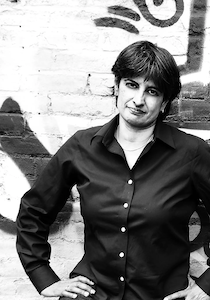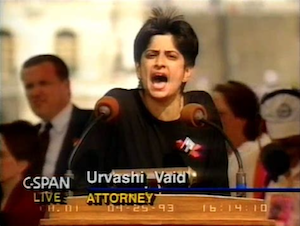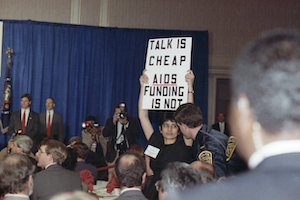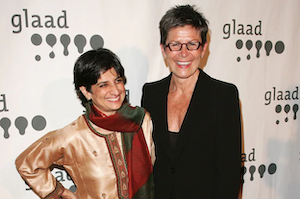Urvashi Vaid was a lawyer, activist, and champion of equality for all. She is notable for her LGBTQ+ activism and leadership of the National Gay and Lesbian Task Force during the AIDS crisis. Her life was defined by her fight for social justice and her impact is immeasurable.

Vaid was born on October 8, 1958 in New Delhi, India. Her mother was a poet and painter while her father, Krishna Baldev Vaid, was a well-known Hindi fiction writer and playwright. He had a notably experimental style with works critical of current beliefs and institutions, which were heavily influenced by his experience of the partition of India and Pakistan. His writing expertise eventually led to a position as an English professor at the State University of New York, Potsdam, which led to the Vaid family moving to New York in 1966. A mere three years later, at age eleven, Urvashi began her lifelong investment in politics and activism after attending an anti-Vietnam war protest.
She continued her advocacy at Vassar College, a private liberal arts college in Poughkeepsie, New York. There, in an environment full of protest and fight for the future, she began her activism in earnest. Vaid, along with future United Nations department director Susan Allee, began organizing a Feminist Union and protested the university’s marketing towards male students. Furthermore, she joined fellow activist students in the push for Vassar to divest from South Africa. In 1985, the movement succeeded and Vassar committed to selling holdings of companies that supported apartheid in the country. In a later conference on LGBTQ+ history at Vassar, Vaid credited the college for providing an environment in which she could learn the important skills of organizing, running organizations, and mediating conflicts. She graduated in 1979 with a bachelor’s degree in English and Political Science.
By the next year, she moved to Boston and went to study Law at Northeastern University, one of the few schools with a public-interest law specialization. The city was considered a center of LGBTQ+ activism, and the publishing home of the national weekly Gay Community News. Vaid eventually began working at the newspaper and additionally created the Boston Lesbian/Gay Political Alliance, which distributed newsletters and participated in fundraising as well as political endorsement. After graduating from Northeastern in 1983, Vaid’s prominence on a national level began to grow.

Her first major endeavor was in 1984 with the National Prisons Project, where she initiated work with prisoners who had HIV. She was a staff lawyer with the American Civil Liberties Union and litigated class action lawsuits against prison conditions and the current treatment for those with the condition. From there, she continued her work relating to HIV/AIDS through the National Gay and Lesbian Task Force, the country’s oldest national LGBTQ+ advocacy group.
Initially, she was the media director before eventually becoming the executive director for the advocacy group. Vaid led the group during the height of the AIDS epidemic, a time in which laws against same-sex marriage, homophobia, and fear surrounding the virus were common. The Task Force contradicted this by promoting LGBTQ+ rights and acceptance. One successful endeavor that the Force organized was the 1987 National March on Washington for Lesbian and Gay Rights. At least 750,000 to a million people participated, and there was a huge increase in visibility and membership for ACT UP, the AIDS advocacy group promoted by the march. While working with the organization, Vaid also helped create the annual Creating Change conference, providing resources and advice for activists for the last 30 years. In effect, her work with the Task Force brought aspects of LGBTQ+ life and struggle into the public consciousness.
Vaid left the Task Force in 1992 to focus on writing her book, Virtual Equality. The book was one of her most successful and argued that the movement for LGBTQ+ rights should focus on real liberation, acknowledgement, and acceptance of their identities and views instead of just recognition of their existence. Along those lines, Vaid also argues for more gender identities to be acknowledged and celebrated, which was a position that was very much ahead of its time. Though Virtual Equality received some mixed reviews due to the “plodding, repetitive prose,” the book was highly praised. In fact, her word received the Stonewall Book Award for nonfiction in 1996, thus being recognized by the American Library Association as having “exceptional merit relating to the gay/lesbian/bisexual/transgender experience.” The book joined a list that now includes other celebrated titles such as Last Night at the Telegraph Club and Magnus Chase.

Though Vaid often had slightly different ideas from those around her, focusing on liberation instead of solely rights, her approach was proven effective and predictive of the future climate. Drawing on her experiences as a lesbian immigrant from India, she asserted that true equity for the LGBTQ+ movement could not be achieved without also focusing on gender, racial, and economic equality. Essentially, she brought awareness to intersectionality before it had even been defined.
Her different approach to various issues served her well in the many charitable foundations and groups that she served on after finishing her book. At charities such as Ford, Arcus, and LPAC, Vaid worked to fund incredibly successful programs such as the Triangle Foundation and Michigan Equality. She also created The Vaid Group, a consulting firm for change-makers that has advised Rutgers University and the National Institute for Reproductive Health.
Throughout her life, Vaid was the center of various progressive issues and was an extremely passionate advocate for marginalized groups. She was sometimes arrested for her acts of protest, an example being that during a rally outside of the Supreme Court focused on abortion. In fact, one of the most iconic images of her was taken shortly before being removed from the room by police. During Bush’s first speech on AIDS, once he made clear he was not taking any impactful action, she held up a sign displaying the words “Talk is cheap, AIDS funding is not.” She shouted that Bush should have spoken about the topic much sooner and was removed from the scene. Vaid has been described as a coalition builder who was able to get support for the issues that she cared about, whether through behind the scenes work or speeches. In fact, during the 1993 March On Washington for Gay Rights, it was estimated that Vaid gave a speech to over a million people. Regardless of the method of her impact, it is certain that it is immeasurable.

Not much is known about her personal life, save for a few details. She was married to political comedian Kate Clinton, and the two split their time between Provincetown and Manhattan. They had met at a 1988 conference and eventually married. The two reportedly threw legendary dinner parties, replete with delicious Indian food and a star-studded cast: Vaid was friends with a wide range of people, including Billie Jean King and Natalie Diaz. King once said that Vaid knew nearly everything about anything, and whenever he had a political question, he would call her, and she would skillfully explain it to him. She was an inspiring and influential character in the lives of everyone around her.
Unfortunately, Vaid was diagnosed with thyroid cancer in 2005 and then breast cancer ten years later. One of her last public appearances was in March 2022 to accept the Susan J. Hyde Award for Longevity in the Movement at the Creating Change conference that she had helped start. She passed away shortly after, on May 14 at age 63. Even now, after her death, advocacy organizations continue to be inspired and shaped by Vaid’s work. The current executive director of the Task Force, Kierra Johnson, said of Vaid after her death: “Her leadership, vision and writing helped shape not only the Task Force’s values and work but our entire queer movement and the larger progressive movement. We will strive every day to live up to her ideals and model the courage she demonstrated every day as an activist and a person.”
Why Did I Choose to Research Urvashi Vaid?
Vaid is extremely accomplished and inspiring and has been my role model since I found out about her work advocating for equality. It feels like we are similar in a lot of ways, whether that’s our interests or our heritage. I’ve also wanted to read Virtual Equality for a while now, and I’m slowly working through the other books that have won the Stonewall Award. Though she passed away recently, I hope my research can contribute to a lasting memory of her and her impact on the world.
Works Cited
The American LGBTQ+ Museum — Urvashi Vaid. (n.d.). The American LGBTQ+ Museum. Retrieved June 18, 2022, from https://americanlgbtqmuseum.org/profile/urvashi-vaid/Flyers.
Archives and Special Collections. (1988). Northeastern University Archives. Retrieved June 18, 2022, from https://archivesspace.library.northeastern.edu/repositories/2/archival_objects/285758.
Gessen, M. (2022, May 24). The Prolific Activism of Urvashi Vaid. The New Yorker. Retrieved June 18, 2022, from https://www.newyorker.com/news/postscript/the-prolific-activism-of-urvashi-vaid.
Mello-Klein, C. (2022, May 20). Urvashi Vaid, Northeastern alum, remembered as legendary LGBTQ activist. News @ Northeastern. Retrieved June 18, 2022, from https://news.northeastern.edu/2022/05/18/urvashi-vaid-lgbtq-activist/.
Michael, J. A. (2022, May 24). Leaving a Legacy: Urvashi Vaid’s Lasting Impact on Michigan’s LGBTQ+ Community. Pride Source. Retrieved June 18, 2022, from https://pridesource.com/article/leaving-a-legacy-urvashi-vaids-lasting-impact-on-michigans-lgbtq-community/.
Randolph, E. (2011). Smashing History. This Is Vassar. Retrieved June 18, 2022, from https://www.vassar.edu/alumsdigest/issues/2011/12/smashing-history.html.
Rathjen, R. (2022, May 19). STATEMENT ON THE PASSING OF URVASHI VAID, ACTIVIST, AUTHOR, ATTORNEY AND PAST TASK FORCE EXECUTIVE DIRECTOR. National LGBTQ Task Force. Retrieved June 18, 2022, from https://www.thetaskforce.org/passing-of-urvashi-vaid-activist-author-attorney-and-past-task-force-executive-director/.
Risen, C. (2022, May 19). Urvashi Vaid, Pioneering L.G.B.T.Q. Activist, Is Dead at 63. The New York Times. https://www.nytimes.com/2022/05/17/us/urvashi-vaid-dead.html.
Smith, H. (2022, May 17). Urvashi Vaid, forward-thinking rights activist, dies at 63. Washington Post. Retrieved June 18, 2022, from https://www.washingtonpost.com/obituaries/2022/05/16/lgbtq-activist-urvashi-vaid-dead/.
Vassar College (Wayback Machine). (2007). Wayback Machine. Retrieved June 18, 2022, from http://web.archive.org/web/20060829051553/http://specialcollections.vassar.edu/exhibits/fergusson_years/example01.html.
This article was published on 2/8/23